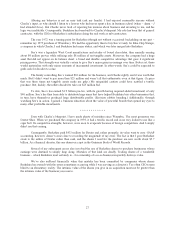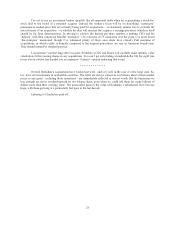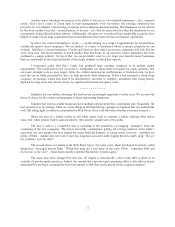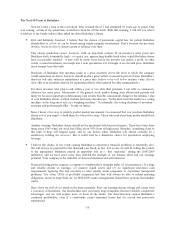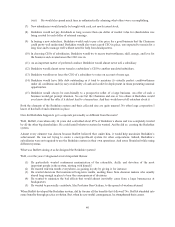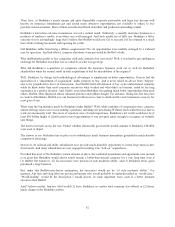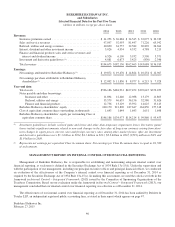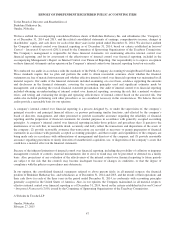Berkshire Hathaway 2014 Annual Report Download - page 39
Download and view the complete annual report
Please find page 39 of the 2014 Berkshire Hathaway annual report below. You can navigate through the pages in the report by either clicking on the pages listed below, or by using the keyword search tool below to find specific information within the annual report.My successor will need one other particular strength: the ability to fight off the ABCs of business decay,
which are arrogance, bureaucracy and complacency. When these corporate cancers metastasize, even the
strongest of companies can falter. The examples available to prove the point are legion, but to maintain
friendships I will exhume only cases from the distant past.
In their glory days, General Motors, IBM, Sears Roebuck and U.S. Steel sat atop huge industries. Their
strengths seemed unassailable. But the destructive behavior I deplored above eventually led each of them to
fall to depths that their CEOs and directors had not long before thought impossible. Their one-time
financial strength and their historical earning power proved no defense.
Only a vigilant and determined CEO can ward off such debilitating forces as Berkshire grows ever larger.
He must never forget Charlie’s plea: “Tell me where I’m going to die, so I’ll never go there.” If our non-
economic values were to be lost, much of Berkshire’s economic value would collapse as well. “Tone at the
top” will be key to maintaining Berkshire’s special culture.
Fortunately, the structure our future CEOs will need to be successful is firmly in place. The extraordinary
delegation of authority now existing at Berkshire is the ideal antidote to bureaucracy. In an operating sense,
Berkshire is not a giant company but rather a collection of large companies. At headquarters, we have
never had a committee nor have we ever required our subsidiaries to submit budgets (though many use
them as an important internal tool). We don’t have a legal office nor departments that other companies take
for granted: human relations, public relations, investor relations, strategy, acquisitions, you name it.
We do, of course, have an active audit function; no sense being a damned fool. To an unusual degree,
however, we trust our managers to run their operations with a keen sense of stewardship. After all, they
were doing exactly that before we acquired their businesses. With only occasional exceptions, furthermore,
our trust produces better results than would be achieved by streams of directives, endless reviews and
layers of bureaucracy. Charlie and I try to interact with our managers in a manner consistent with what we
would wish for, if the positions were reversed.
‹Our directors believe that our future CEOs should come from internal candidates whom the Berkshire
board has grown to know well. Our directors also believe that an incoming CEO should be relatively
young, so that he or she can have a long run in the job. Berkshire will operate best if its CEOs average well
over ten years at the helm. (It’s hard to teach a new dog old tricks.) And they are not likely to retire at 65
either (or have you noticed?).
In both Berkshire’s business acquisitions and large, tailored investment moves, it is important that our
counterparties be both familiar with and feel comfortable with Berkshire’s CEO. Developing confidence of
that sort and cementing relationships takes time. The payoff, though, can be huge.
Both the board and I believe we now have the right person to succeed me as CEO – a successor ready to
assume the job the day after I die or step down. In certain important respects, this person will do a better
job than I am doing.
‹Investments will always be of great importance to Berkshire and will be handled by several specialists.
They will report to the CEO because their investment decisions, in a broad way, will need to be
coordinated with Berkshire’s operating and acquisition programs. Overall, though, our investment
managers will enjoy great autonomy. In this area, too, we are in fine shape for decades to come. Todd
Combs and Ted Weschler, each of whom has spent several years on Berkshire’s investment team, are first-
rate in all respects and can be of particular help to the CEO in evaluating acquisitions.
All told, Berkshire is ideally positioned for life after Charlie and I leave the scene. We have the right
people in place – the right directors, managers and prospective successors to those managers. Our culture,
furthermore, is embedded throughout their ranks. Our system is also regenerative. To a large degree, both
good and bad cultures self-select to perpetuate themselves. For very good reasons, business owners and
operating managers with values similar to ours will continue to be attracted to Berkshire as a one-of-a-kind
and permanent home.
37


